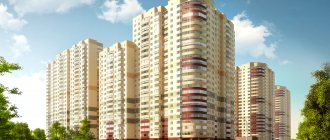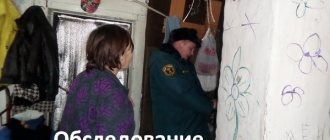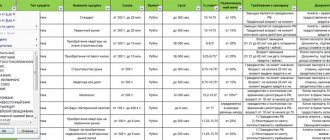Who can apply for improvements?
According to the current housing legislation, there are categories of citizens who have the right to apply for registration as a person in need:
- Low-income citizens
Recognition of a citizen as such occurs by assessing his income and property, which is subject to taxation, and varies depending on the subject of the Russian Federation,
- disabled people,
- war veterans,
- minor children and orphans,
- heroes of the USSR, heroes of the Russian Federation,
- rescue workers, police officers,
- citizens who are not social housing tenants and members of their families;
- citizens who do not own living space and are not part of the family of those who do;
- citizens who are not provided with the minimum living space per person according to the norm;
- citizens living in the same living space with a person who has a chronic illness that prevents the possibility of living together with him.
How to get in line for housing in the Moscow region
Residents of the Moscow region of certain categories can receive housing under a social rental agreement free of charge. Read about what requirements must be met and how to register as someone in need of housing in the material on the mosreg.ru portal.
How to obtain the status of a person in need of social services in the Moscow region>>
Who is eligible
A new residential building with 553 apartments was built in Mytishchi
Source: Main Directorate of State Construction Supervision of the Moscow Region
Citizens recognized as low-income can register as those in need of residential premises provided under a social tenancy agreement. Citizens of the Moscow region can be recognized as low-income if the amount of average per capita income and the estimated value of property is lower than or equal to the threshold value of income and property value. Threshold values are set by municipal administrations.
In order to register as someone in need of housing, a resident of the Moscow region recognized as low-income must meet a number of other requirements:
• do not own residential premises or are not a tenant of residential premises under a social tenancy agreement. The same requirements apply to members of his family;
• if a citizen or members of his family own housing or it is used under a social tenancy agreement, then the total area of living space per family member must be less than the accounting norm. The accounting standard is also established by the municipal administration. It is important to distinguish between the accounting norm and the provision norm. The provision norm refers to the apartment that must be provided to those on the housing waiting list;
• live in premises that do not meet the requirements established for residential premises;
• own an apartment or be a tenant of residential premises under a social tenancy agreement and live in an apartment occupied by several families, if the family includes a patient with a severe form of chronic disease, in which living together with him in the same apartment is impossible. The list of diseases was approved by the Ministry of Health of the Russian Federation.
Housing stock of the Moscow region: how is the resettlement of emergency housing going?>>
Required documents
Pile of papers
Source: RIAMO, Alexander Kozhokhin
In order to register as a person in need of residential premises provided under a social tenancy agreement, you will need the following documents:
• financial personal account;
• medical report on a severe form of chronic disease (if any);
• application for registration as a municipal housing stock in need of residential premises;
• identification documents of the applicant and his family members;
• extract from the house register;
• technical passport for residential premises (if there is housing owned or rented under a social tenancy agreement);
• documents confirming the right to use the residential premises occupied by the applicant and his family members;
• documents confirming the applicant's family relations;
• an inspection report of the applicant’s living conditions (confirming the non-compliance of the living premises with established sanitary and technical rules and regulations, and other legal requirements).
Mortgage holidays in the Moscow region: how to get a deferred payment>>
Where to go
The second MOBTI consultation center was opened in Krasnogosk
Source: , press service of the Krasnogorsk city district administration
In order to register as someone in need of housing, you need to contact the municipal administration or the MFC at your place of residence.
Even if you have all the documents and meet all the requirements, a citizen may be denied registration if he deliberately worsened his living conditions less than 5 years ago.
Family in the broad sense of the word
It is worth understanding what meaning housing legislation gives to the concept of “family member” and who it includes.
Family members include persons who live with the owner of the residential premises:
- spouse,
- parents,
- children,
- other relatives
- sometimes disabled citizens who are moved into the apartment by the owner himself as a family member can be recognized as such.
The key role is played by the confirmed fact of cohabitation of these persons with the owner of the premises.
Grounds for refusal to recognize people in need
Authorities may refuse to grant the status of those in need. If the refusal is not justified, you will have to take legal action.
The grounds for refusal are provided for in Art. 54 Housing Code of the Russian Federation:
- a complete package of documents has not been provided;
- information indicates that the citizen does not have the right to be registered;
- the citizen specifically performed a number of actions in order to obtain the right to improved living conditions.
The last point includes, for example, registration of a fictitious marriage or its dissolution - after all, in this case the number of meters or apartments increases.
Supreme Court explains
Situation from practice
Andrey Ivanov is a major of the Ministry of Internal Affairs, he served in the police for 15 years. For a long time he lived and was registered in his mother’s apartment; he did not have his own living space. Andrei’s son was also registered and lived there. It's a bit cramped.
An attempt to improve conditions
Andrei decided to leave his mother’s apartment in order to register and get his own housing. A couple of months after deregistering himself, he applied to local authorities to recognize him as in need of improved housing conditions. The answer did not take long to arrive, and Andrei was refused. To justify the refusal, a reference was made to the fact that the citizen did not provide a document confirming his place of residence for recent periods.
The refusal seemed unfounded to Andrey, and he went to court to appeal it.
Case in court
The court sided with the major and ordered the department to register the family. In support of its decision, the court explained that Andrey provided all the necessary documents that are sufficient to receive the appropriate “housing” payment. The court also added that failure to provide such documents still does not limit the applicant’s right.
Andrei’s mother, according to the court, is not a member of his family, since their cohabitation is not confirmed by anything. Thus, the moment of Andrei’s discharge from his mother’s apartment, where he lived all the time and according to the law there were enough square meters per person, was not taken into account by the court at all.
The second instance left the decision unchanged.
Supreme Court refusal
The situation changed when the department filed a cassation appeal to the Supreme Court.
When considering the case, the court found it erroneous to believe that Andrei, his son and mother are not one family. The Housing Code clearly establishes a refutation of this in Part 1 of Art. 31.
In order for Andrei and his son to be recognized as members of the mother’s family, it is only necessary to establish the fact that they live together. There is no need to prove that they helped each other financially and ran the household together.
The Supreme Court undertook to check the necessary circumstances and found that Andrei, by deregistering himself and renouncing the right to use his mother’s apartment, deliberately worsened his living conditions. Man made himself needy.
According to Part 8 of Art. 4 of Law No. 283-FZ, such actions of a citizen serve as a direct reason for refusal to register.
The decision of the previous authorities was overturned. Andrey took his case for a new trial.
Design features depending on status
Depending on which category the applicant belongs to, the procedure may have certain features. Let's look at each of them in more detail.
Poor
According to Art. 49 of the Housing Code of the Russian Federation, the poor are families whose total income per person is less than the subsistence level approved for the region. Current information on the cost of living by region can be found in the Federal State Statistics Service.
Before submitting documents, it is necessary to calculate whether the family really meets the established criteria:
- Sum up the total household income for the last three full months. All income to the family budget is taken into account - wages, pensions, scholarships, rental income, alimony, etc.
- Divide the resulting amount by three. This figure indicates the average family income per month.
- Monthly income is divided by the number of family members.
- The amount received is compared with the cost of living in the region. If the number is lower, the family is poor.
Family members in this case are all relatives living in the apartment. In other words, the income of all persons indicated in the house register is taken into account.
Low-income status is assigned separately. Accordingly, you first need to receive it, and then apply for recognition as needing improved housing conditions.
Young family
To be able to participate in federal and regional programs to support young families, you must meet the following criteria:
- complete (two parents) or incomplete (one parent) family;
- presence of children (in some regions participation in the program without children is acceptable);
- age at the time of receiving the subsidy is no more than 35 years;
- having a permanent source of income;
- permanent registration in the region of participation in the program.
The registration procedure is quite lengthy. Documents are submitted in the first six months (until June), and receipt of payments is possible only next year.
Disabled people
Regional authorities provide people with disabilities, as well as families with disabled children, the opportunity to obtain the status of those in need of improved housing conditions. To do this, it is necessary to document the presence of disability.
According to the law, there are no differences between disabled people of different groups. However, there is an opinion that in practice the queue moves faster for disabled people of groups I and II.
Military personnel
Persons serving in the ranks of the armed forces of the Russian Federation have the right to count on receiving official housing. For example, if a serviceman’s family moved to another locality and does not have living space there, they will be provided with premises.
In reality, despite the need for housing and the right to receive it, there is not enough real estate in the fund. For this reason, you often have to wait for years to move in. If a person has served for more than ten years and has been registered for improvement of living conditions all this time, he cannot be fired just like that. In connection with this situation, he will be provided with housing or financial assistance to acquire real estate ownership.
Nuances of housing behavior in the services market
Despite the existing legislation, there are a number of nuances that are almost impossible to get around. Reading the law - it seems like a person in need, applying the amendments - no. So, the essential little things:
- Each region of the Russian Federation has its own norms of square meters per person. According to the Federal Law, this is 12 m2, regional authorities should rely on this minimum as a base;
- if a citizen cannot buy an apartment even with the help of various government subsidies, then he can be offered housing from the municipal fund and the possibility of further privatization;
- if the area is less than the established standard, then the authorities go through each tenant, suddenly among them is one who does not have a residence permit or has housing on the side;
- when a person lives in conditions that include several selection criteria (small housing, dilapidated, dilapidated, etc.), then the subsidy is given only for 1 point;
- the status of a person in need must be confirmed annually; if suddenly the applicant’s salary increases in the new year or he inherits housing, then he is removed from the waiting list.
When allocating new housing, applicants are considered not only in terms of need, but also by age, gender, acquired illnesses, and disabilities. Thus, a mother and teenage son, as well as a mother and brother and sister (over 9 years old) cannot live in the same room. They are assigned different rooms.
An elderly person should also have their own room, and two families with children who previously lived in one small apartment can count on separate housing.







